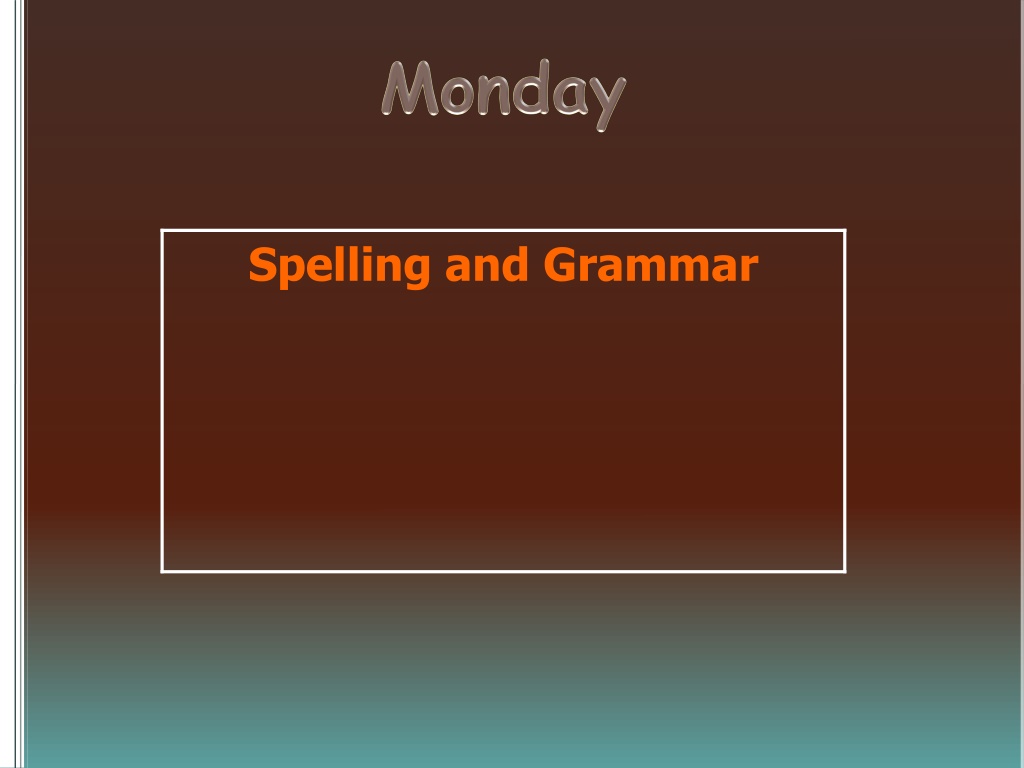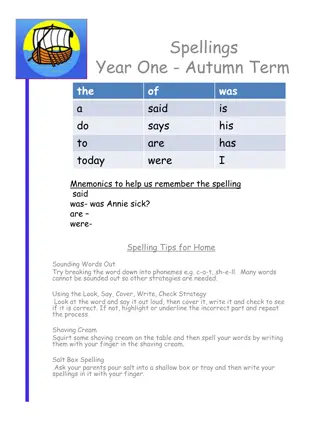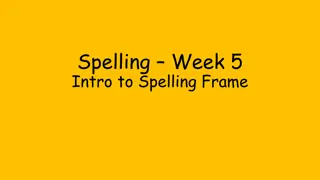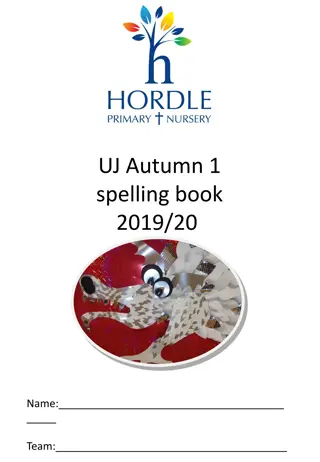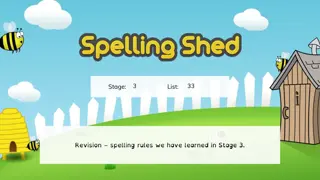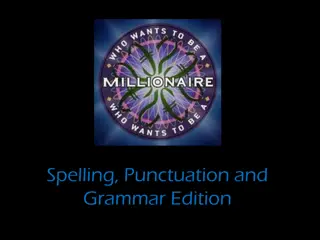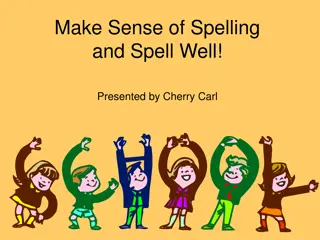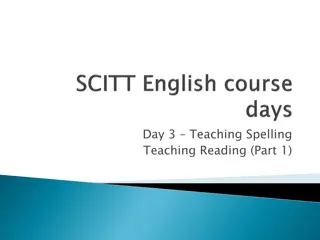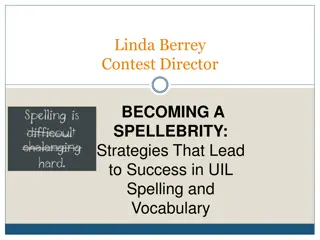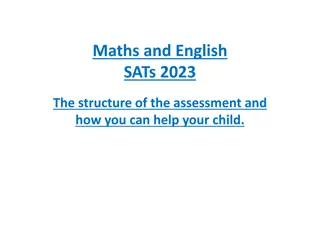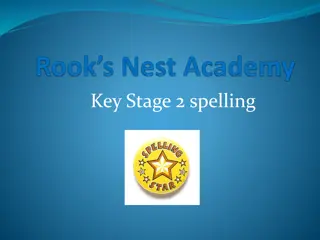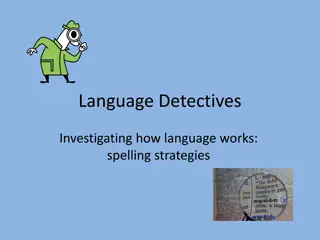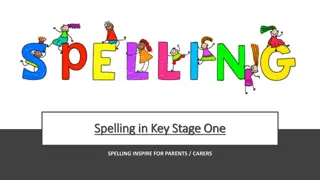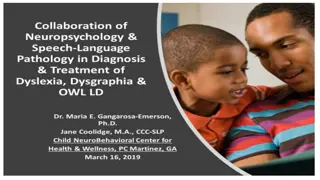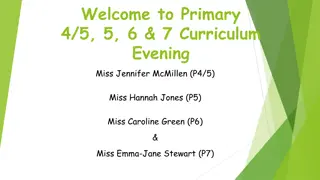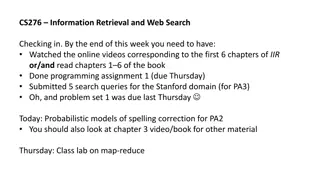Mastering Spelling and Grammar: A Comprehensive Guide
Enhance your writing skills by mastering spelling, grammar, and pronoun usage with practical examples. Understand how pronouns relate to antecedents and ensure agreement in number and gender. Improve clarity and coherence in your writing by following essential rules and principles.
Download Presentation

Please find below an Image/Link to download the presentation.
The content on the website is provided AS IS for your information and personal use only. It may not be sold, licensed, or shared on other websites without obtaining consent from the author. Download presentation by click this link. If you encounter any issues during the download, it is possible that the publisher has removed the file from their server.
E N D
Presentation Transcript
discontent decline outward dispatch unwavering destruction disintegrate outstanding uncommon outburst outrageous defensive unappetizing disillusioned disarray unconscious outskirts unfasten disenchanted decompose unbusinesslike disembark deactivate disenfranchise outlandish adolescence
she thought the pare was unapetizing She thought the pear was unappetizing. the zoo attendant s welcomed all the chidren and his parents The zoo attendants welcomed all the children and their parents.
People throughout the world know Jane Goodall and respect her. The pronoun her refers to the antecedent Jane Goodall. An antecedent is the noun to which a pronoun refers. A pronoun and its antecedent can appear in the same sentence or in separate sentences.
A pronoun takes the place of a noun or nouns. An antecedent, or referent, is the noun or nouns to which the pronoun refers. A pronoun and its antecedent must agree in number and gender.
Before you use a pronoun, ask yourself whether the antecedent is singular or plural. If the antecedent is singular, decide whether it is masculine, feminine, or neuter. Then choose a pronoun that agrees.
In the following sentences, the antecedents are underlined once; the pronouns are underlined twice. Sal and Jo bought a book about chimps, and they read it together. Erik brought a camera to the zoo so he could take pictures.
The chimpanzees gathered smooth sticks and used them to catch ants. The chimpanzees gathered smooth sticks and used them to catch ants. Jane Goodall observed chimpanzees and helped them survive in nature. Jane Goodall observed chimpanzees and helped them survive in nature.
Chimpanzees have interesting ways of finding food when they are hungry. Chimpanzees have interesting ways of finding food when they are hungry.
Although Vicky learned to say four words, very few people could understand her. Although Vicky learned to say four words, very few people could understand her.
We students are eager to meet Jane Goodall when she speaks at the school. We students are eager to meet Jane Goodall when she speaks at the school.
Ai grabbed the doll and hugged it. Ai grabbed the doll and hugged it. In 1961, Ham was placed aboard a rocket to see whether he could survive the space flight. In 1961, Ham was placed aboard a rocket to see whether he could survive the space flight.
they it she us him Paige and I wanted to hold the baby chimp, but the mother would not let _____. Paige and I wanted to hold the baby chimp, but the mother would not let us.
they it she us him Chimpanzees cannot speak because _____ have different vocal cords than ours. Chimpanzees cannot speak because they have different vocal cords than ours.
they it she us him After Lucy grabbed a stone, ____ use it to crack open a nut. After Lucy grabbed a stone, she used it to crack open a nut.
they it she us him The chimpanzee saw the banana and reached for ____. The chimpanzee saw the banana and reached for it.
they it she us him Bill will take pictures if you give ____ film. Bill will take pictures if you give him film.
discontent decline outward dispatch unwavering destruction disintegrate outstanding uncommon outburst outrageous defensive unappetizing disillusioned disarray unconscious outskirts unfasten disenchanted decompose unbusinesslike disembark deactivate disenfranchise outlandish adolescence
the monkeys was difensive about territory that they thought belonged to him The monkeys were defensive about territory that they thought belonged to them. dad drived aunt paula and i to the zoo Dad drove Aunt Paula and me to the zoo.
A pronoun takes the place of a noun or nouns. An antecedent, or referent, is the noun or nouns to which the pronoun refers. A personal pronoun and its antecedent must agree in number and gender.
discontent decline outward dispatch unwavering destruction disintegrate outstanding uncommon outburst outrageous defensive unappetizing disillusioned disarray unconscious outskirts unfasten disenchanted decompose unbusinesslike disembark deactivate disenfranchise outlandish adolescence
jane goodall have exhibited her unwaivering devotion to chimps Jane Goodall has exhibited her unwavering devotion to chimps. the apes outburst surprised she The ape s outburst surprised her.
A pronoun takes the place of a noun or nouns. An antecedent, or referent, is the noun or nouns to which the pronoun refers. A personal pronoun and its antecedent must agree in number and gender.
If a pronouns antecedent is confusing, the sentence should be rewritten. Sometimes it is clearer to use a noun instead of a pronoun. Unclear: Pat and Kate went to her house. Clear: Pat and Kate went to Pat s house.
Review something you have written to check that pronouns have clear antecedents.
discontent decline outward dispatch unwavering destruction disintegrate outstanding uncommon outburst outrageous defensive unappetizing disillusioned disarray unconscious outskirts unfasten disenchanted decompose unbusinesslike disembark deactivate disenfranchise outlandish adolescence
doug and his classmates has finished her ape projects Doug and his classmates have finished their ape projects. do you agree that the logging companies is destroying the rain forest with their trucks Do you agree that the logging companies are destroying the rain forest with their trucks?
A pronoun takes the place of a noun or nouns. An antecedent, or referent, is the noun or nouns to which the pronoun refers. A personal pronoun and its antecedent must agree in number and gender.
Test Tip: When writing pronouns with appositives, try omitting the noun to see which pronoun form to use. Example: (We, Us) sixth graders use the computers daily. We use computers daily. We sixth graders use the computer daily. Since We is a subject pronoun for the sentence, We is the correct pronoun.
discontent decline outward dispatch unwavering destruction disintegrate outstanding uncommon outburst outrageous defensive unappetizing disillusioned disarray unconscious outskirts unfasten disenchanted decompose unbusinesslike disembark deactivate disenfranchise outlandish adolescence
befour the chimps is fed they chatter in there cages Before the chimps are fed, they chatter in their cages. the crowd are listening to dr goodalls seminar The crowd is listening to Dr. Goodall s seminar.
A pronoun takes the place of a noun or nouns. An antecedent, or referent, is the noun or nouns to which the pronoun refers. A personal pronoun and its antecedent must agree in number and gender.
discontent decline outward dispatch unwavering destruction disintegrate outstanding uncommon outburst outrageous defensive unappetizing disillusioned disarray unconscious outskirts unfasten disenchanted decompose unbusinesslike disembark deactivate disenfranchise outlandish adolescence
